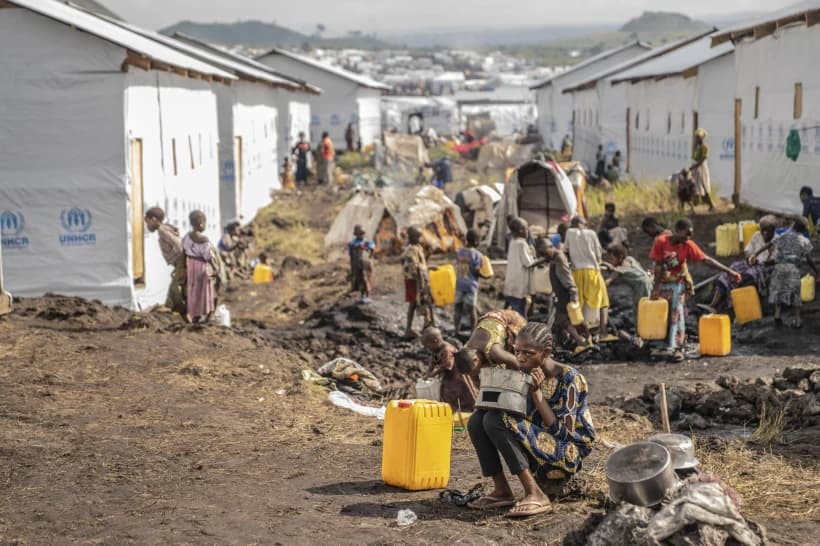YAOUNDÉ, Cameroon – Catholic bishops in the Democratic Republic of the Congo (DRC) are calling on the governments of Rwanda and the DRC to respect the ceasefire recently negotiated by the government of Angola.
On July 30, the Angolan presidency issued a release stating that it had negotiated a ceasefire agreement between Rwanda and the DRC with the aim of silencing the guns in the eastern Congo.
The U.S. Department of State welcomed the ceasefire and noted that the U.S. “stands ready to support the implementation and monitoring of the ceasefire, in particular through the Angolan Ad Hoc Verification Mechanism’s efforts.”
“As the ceasefire is implemented, we call on all actors to respect human rights, adhere to applicable obligations under international humanitarian law, and hold accountable all actors for human rights,” the statement says.
The cease fire was supposed to take effect on August 4, but reports indicate the fighting has continued to rage between Congolese soldiers and Rwanda-backed rebel movement, the M23.
M23 rebels have since been advancing and capturing towns in the restive eastern region, notably Nyamilima and Ishasha-towns they seized on August 7.
“Monusco strongly condemns the violation of the ceasefire of 4 August by the March 23 Movement (M23) with the capture of Ishasha (North Kivu/DRC). This violation compromises stabilization efforts in the region and runs counter to the agreement signed in Luanda on 30 July 2024,” said the UN Stabilization Mission in the Democratic Republic of the Congo.
The rebels have openly signaled their reluctance to abide by the ceasefire deal, saying that they are not “automatically bound by the Luanda negotiations.”
Catholic bishops have therefore called on all sides to the conflict to abide by the ceasefire agreement in the interest of peace.
In their August 7 statement, the bishops called on the governments of the Democratic Republic of Congo and Rwanda to “fully implement the ceasefire agreement.”
“All parties should take into consideration the pressing need to enable all these women, children and men, displaced by the force of recurring insecurity, to live in dignity and peace in their countries of origin, as people created in the image and likeness of God,” the bishops said in the statement signed by the Secretary General of the Bishops’ Conference, Mgr. Donatien Nshole.
“While congratulating everyone on this small step forward, we would point out that this is not the first agreement signed between the governments of Rwanda and the DRC. All the previous agreements have been blithely violated and the various reports relating to them have not given rise to any sanctions,” he said.
President Felix Tshisekedi of the DRC has frequently accused Rwanda of providing arms and troops to support the M23 rebels. Rwanda has denied these accusations but has in turn accused the DRC of backing the Democratic Forces for the Liberation of Rwanda (FDLR) rebels, which are remnants of the 1994 genocide, and now seek to destabilize the Rwandan state.
In their August 7 release, the bishops voiced frustration that “international partners have not considered the war in the east of the DRC to be as high a priority as the war in Ukraine or the situation in the Middle East”.
The war in eastern DRC where more than 120 rebel groups have been active has implications that go beyond the region, involving not only Rwanda but also other neighboring countries, starting with Uganda.
According to a report published by the Congo Study Group at New York University on August 6, the resurgence of fighting by the M23 rebel group in 2021—eight years after its initial defeat in 2013—is closely tied to economic agreements between the DRC and Uganda.
These agreements posed a threat to Rwanda’s position in regional trade.
Rwanda is said to have perceived the reactivation of the M23 as a way to assert its influence against Uganda, its northern neighbor.
However, since April 2022 Rwanda and Uganda have gradually shifted their stance and begun to jointly support the M23, marking a notable change in their approach toward the Congolese situation.
The violence in the east of the DRC has triggered a serious humanitarian crisis with more than 5.5 million people displaced, making it the third largest displacement crisis in the world.
According to a February 14 report by the United Nations, civilians in the east of the DRC “are bearing the brunt of localized violence, amid a sharp upsurge in fighting between government forces and the M23 armed group.”
Catholic bishops in the DRC have been front and center in the search for peace in the eastern Congo.
The bishops’ conference between 2022 and July 2024 carried out nearly ten missions abroad to raise awareness in other countries, with the aim of making international partners know more about the Congolese crisis and encouraging them to become more involved.














